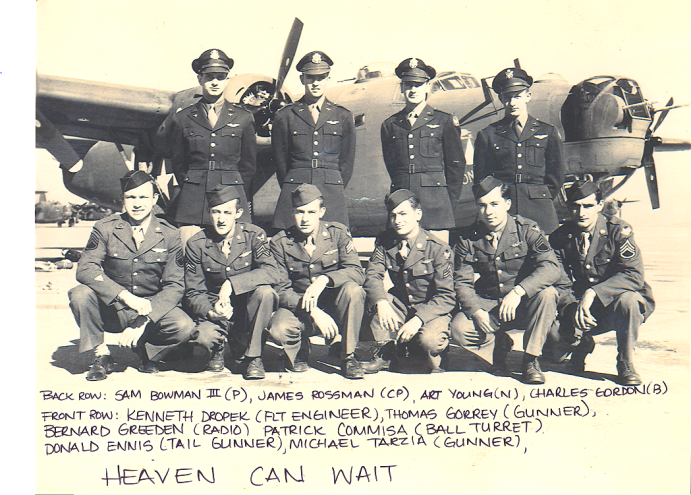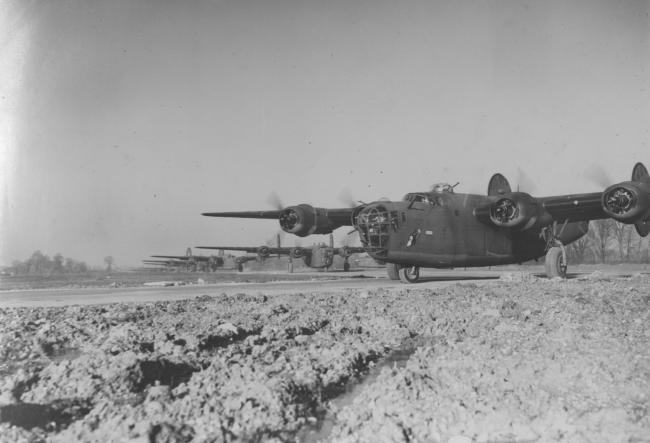James Mervin Rossman
Military
Handwritten on image: 'Back Row: Sam Bowman III (P), James Rossman (CP), Art Young (N), Charles Gordon (B). Front Row: Kenneth Dropek (Flt Engineer), Thomas Gorrey (Gunner), Bernard Greeden (Radio), Patrick Commisa (Ball Turret), Donald Ennis (Tail Gunner), Michael Tarzia (Gunner), HEAVEN CAN WAIT.'
Uploaded
Object Number - UPL 5489 - A bomber crew of the 44th Bomb Group with their B-24 Liberator (serial number 42-7507) nicknamed "Heaven Can Wait". Handwritten on image: 'Back...
Our crew arrived in England on about the last day of November or the first of December, 1943. The American Air Offensive against Nazi Germany was under way with daily strikes against Nazi targets. Our crew, along with six others, were assigned to the 44th Bomb Group at Shipdam, England, to replace crews that had been lost on previous missions.
On March 12, 1944 our crew was scheduled for our sixth mission. We were to go deep into Germany on what we called a DP or deep penetration mission. This meant we carried a full load of bombs plus a full load of gas, some 2700 gallons at 61lbs. per gallon. The weather was bad over Europe, so even before we took off group headquarters changed our mission to an alternate target in France. This was much closer, so we would have more than the required fuel. The weather was bad over the target and I do not recall seeing any enemy fighters. We did however receive some anti-aircraft or flak damage and lost one engine over the target.
The weather was deteriorating as we returned home and when we arrived over England we were flying over a solid cloud cover. This required that we let down through the clouds one ship at a time, and then proceed on to our home base. The group Commander announced over the radio that the cripples could go down first, and as co-pilot, I immediately recommended that we should do that. Sam Bowman, our pilot, did not feel that the loss of one engine qualified us since we should have ample gasoline, as a cripple needing any emergency preference. Unfortunately, there was more damage to fuel tanks and after flying around for three and one half hours it came our turn to let down. We did this and flew into the clear at some 600 feet and quickly spotted a small English Fighter Base with a grass landing strip.
I suggested circling this until our navigator could give us an exact course to follow to get home. Our pilot elected to head in the general direction with the navigator to make corrections as we proceeded. Unfortunately we went out over the English Channel and lost another engine. A B-24 doesn't fly well on two engines and we certainly couldn't climb.
I recall us making a 180 degree turn to go back to the fighter strip and coming back just over the White Cliffs of Dover with no altitude to spare.
Just clearing the cliffs on two engines, our next obstacle was a high tension power line about 200 feet high which we elected to go under rather than attempt to climb. We were heading back to the English Fighter Base when we lost the third engine and all seemed hopeless.
By the grace of God and nothing else, I looked out my right window and there in perfect position for landing was the fighter strip. With no time to prepare or make decisions we turned to line up with the strip. The pilot and I jointly made a picture perfect belly-landing sliding in on the grass, each moment expecting the plane to disintegrate and kill us all.
When the plane came to a stop our whole attitude was that we had miraculously made it. The plane caught fire and Art Young, our navigator, and I were standing below the top escape hatch boosting each of the crewmembers from the flight deck, through the hatch, onto the top of the plane. Suddenly we were engulfed in a complete ball of thick black smoke that we described later as a black bale of cotton. We practically threw Bernie Credo through that hatch and somehow went through together as the last two.
After we were taken to the hospital on this English base to be checked out, something unusual happened. Hospital attendants came bearing a man on a stretcher. He had been cleaning the windshield on an English fighter parked there. He looked up at the last moment to see this four engine A/C pass over his head at between two and four feet. With all engines dead we made no noise and the shock almost caused him to have a heart attack. As for the crew, only Creeden received any injury. Due to being thrown so violently out the hatch that he fell and broke a tooth.
We were returned to our base and back to flying duty. The pilot was awarded the Distinguished Flying Cross for this emergency landing. Later our crew was divided with different individuals going to other crews for varying reasons. The tail gunner was in the hospital for a minor operation. The navigator was transferred to a lead crew. I was fortunate to continue to fly with most of the original crew and was most happy when all of us completed our thirty missions safely.
Of the original crews to join the group with us only ours and one other completed the tour safely and returned to the United States.
On the return from a mission to ST Pol/Siracourt, FR on 12 Mar 1944, AC #42-7507 'Heaven Can Wait', crashed landed at RAF Friston, Sussex and burned. RTD. Completed 30 missions.
Connections
See how this entry relates to other items in the archive by exploring the connections below.
Units served with

- Unit Hierarchy: Group
- Air Force: Eighth Air Force
- Type Category: Bombardment

- Unit Hierarchy: Squadron
- Air Force: Eighth Air Force
- Type Category: Bombardment
People

- Military/Civilian/Mascot: Military
- Nationality: American
- Unit: 44th Bomb Group 68th Bomb Squadron
- Service Numbers: O-742276
- Highest Rank: First Lieutenant
- Role/Job: Pilot
Aircraft

- Aircraft Type: B-24 Liberator
- Nicknames: Heaven Can Wait
- Unit: 392nd Bomb Group 44th Bomb Group 576th Bomb Squadron 68th Bomb Squadron
Places

- Site type: Airfield
- Known as: Pathway
Events
| Event | Location | Date | Description |
|---|---|---|---|
|
Born |
Atlanta, Georgia | 20 August 1922 | |
|
Enlisted |
Camp Blanding, FL | 7 January 1942 | |
|
Died |
Sun City Center, FL | 24 October 2014 | |
|
Buried |
Dade City, FL | 1 November 2014 | Chapel Hill Gardens Dade City, Pasco County, Florida, USA |
Revisions
Drawn from the records of the National Museum of the Mighty Eighth Air Force, Savannah, Georgia / self, Losses of the 8th & 9th Air Forces & Page 392 in the book 2ND AIR DIVISIONby Turner Publishing Company, 1998 edition (D790.A2S45)
